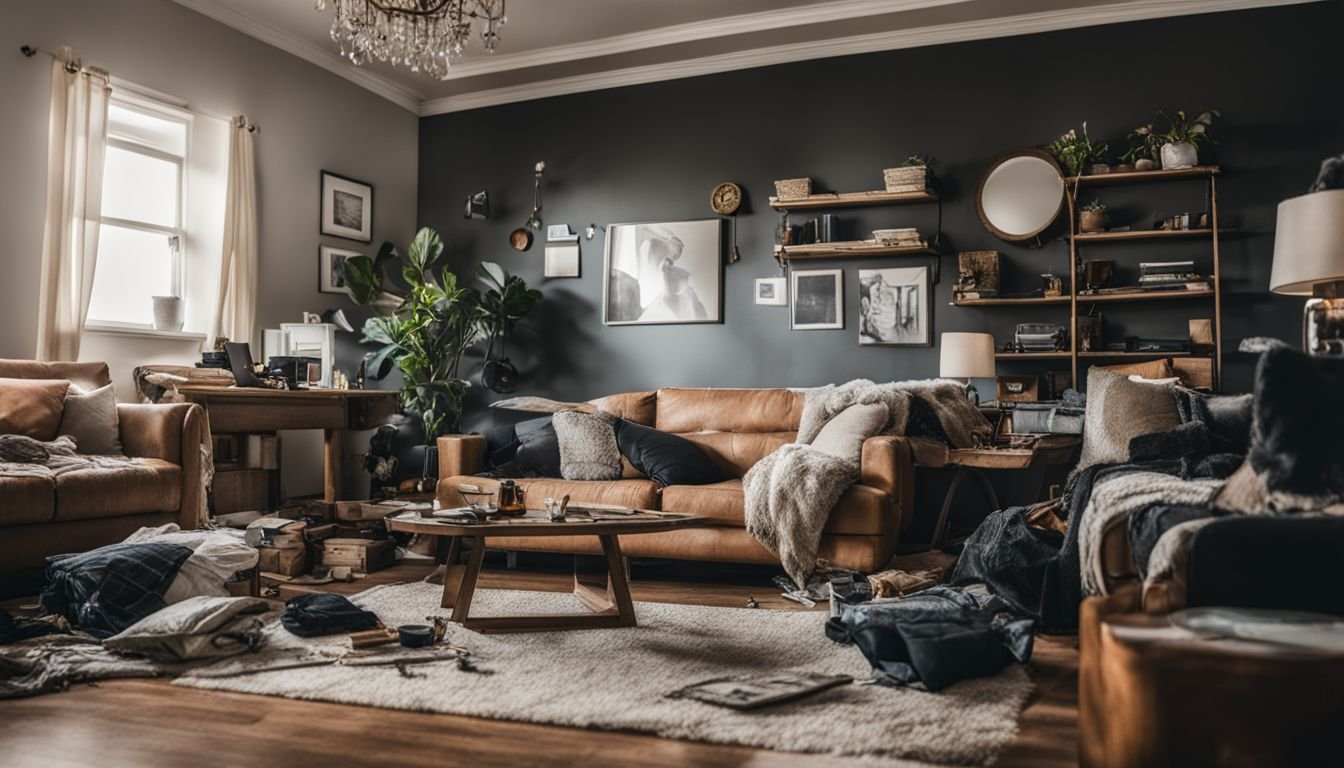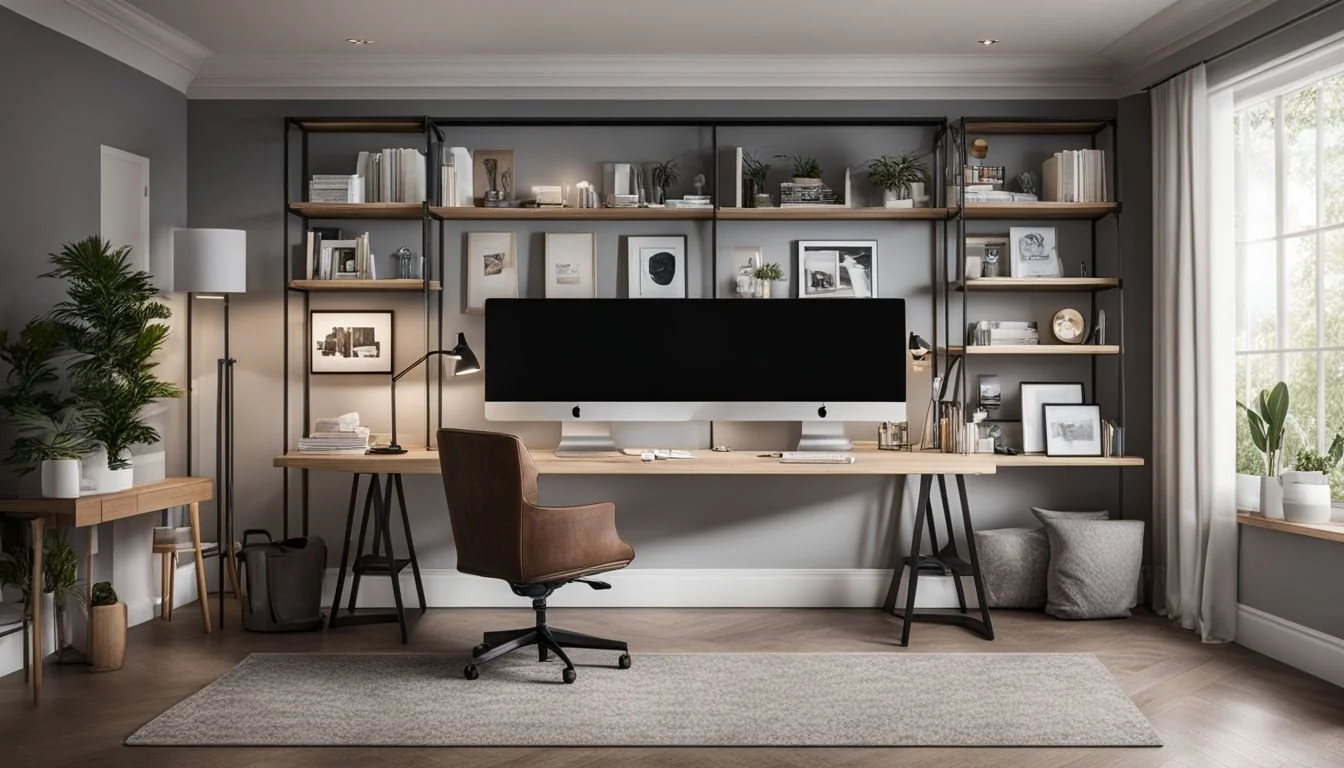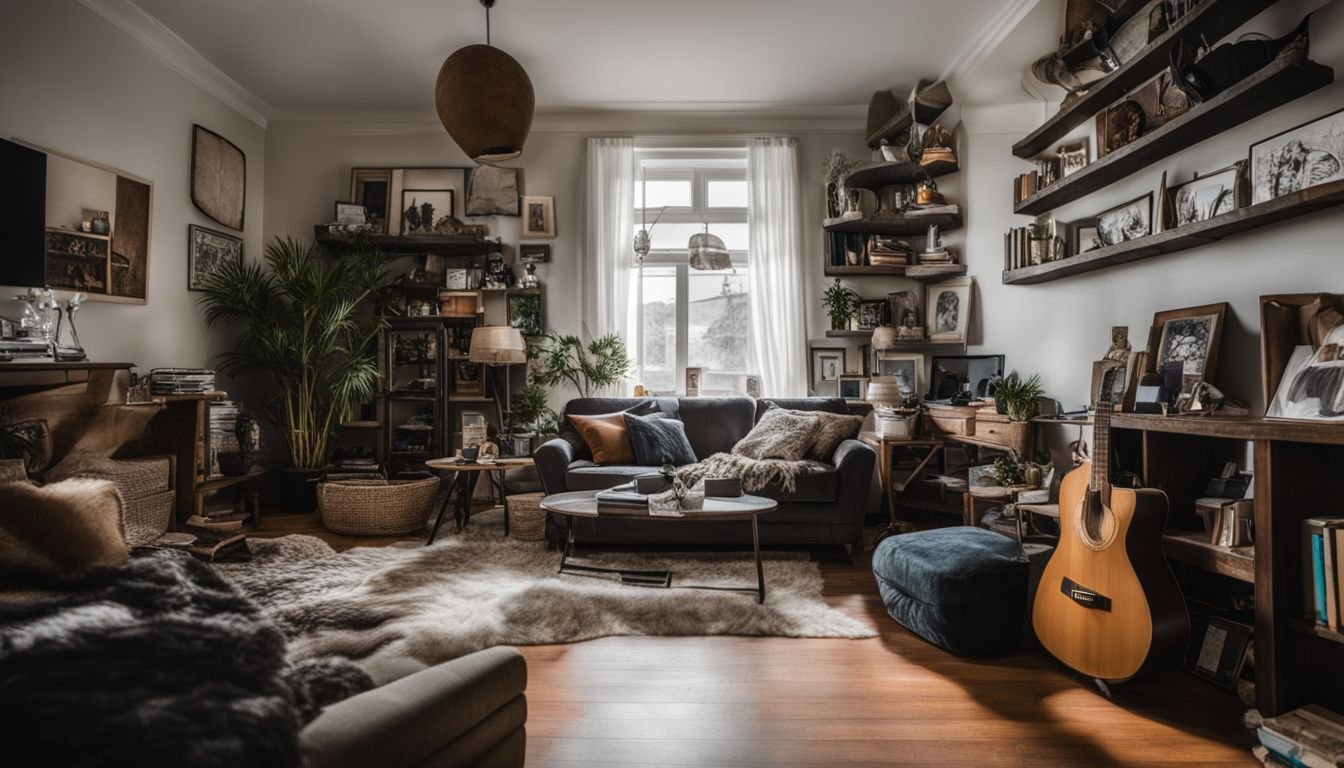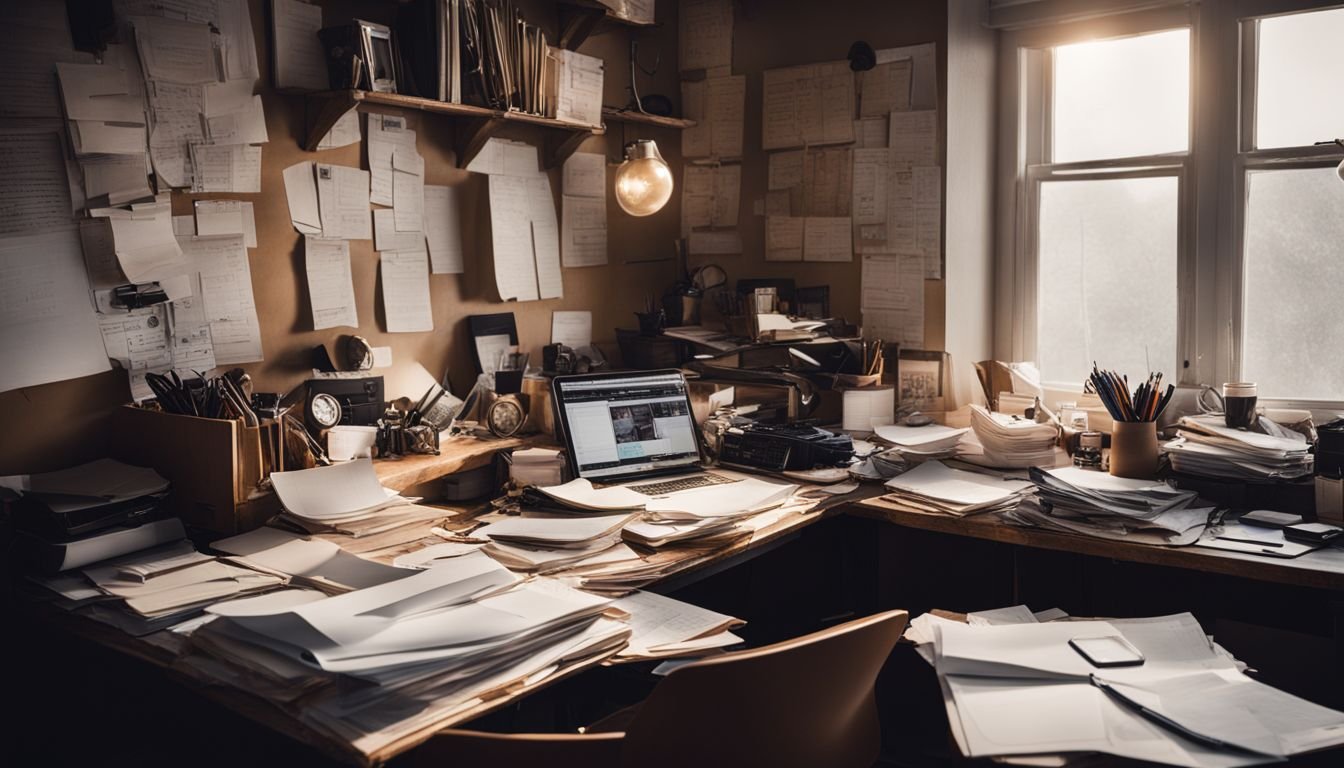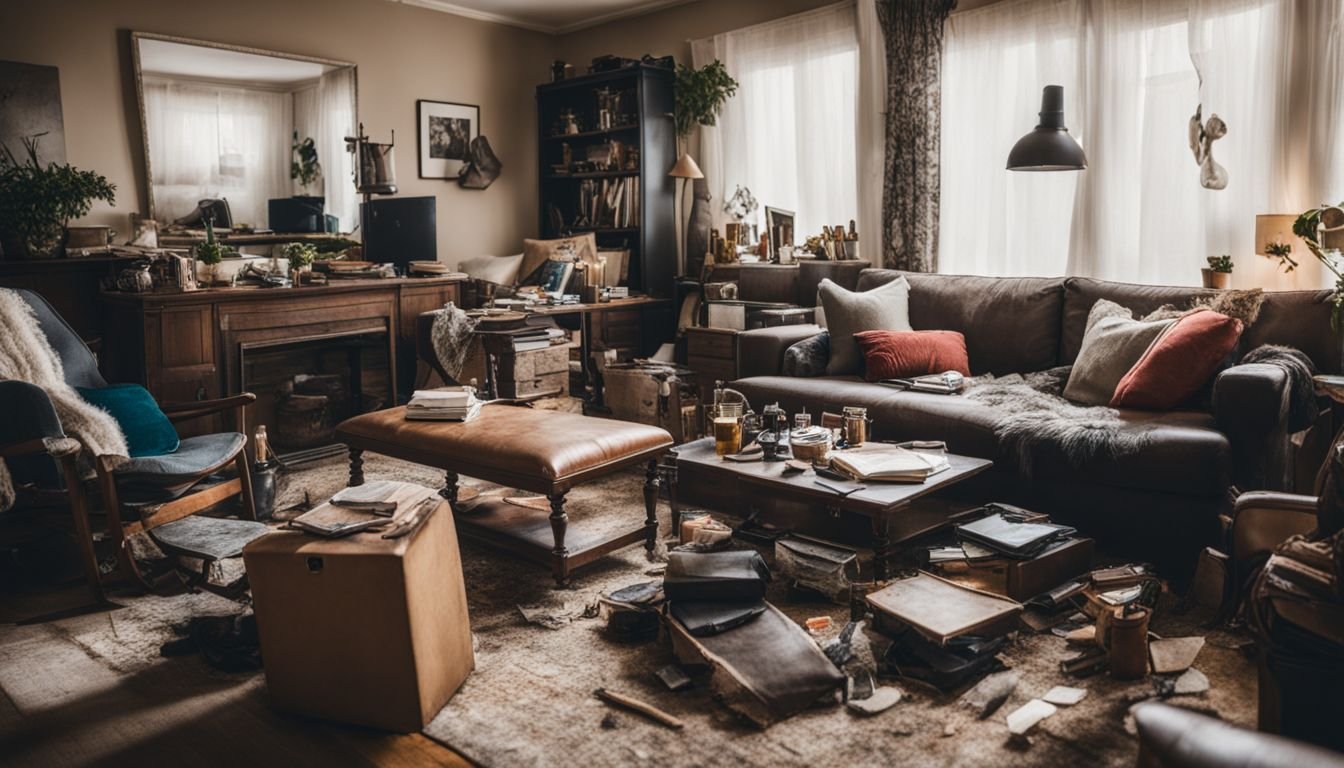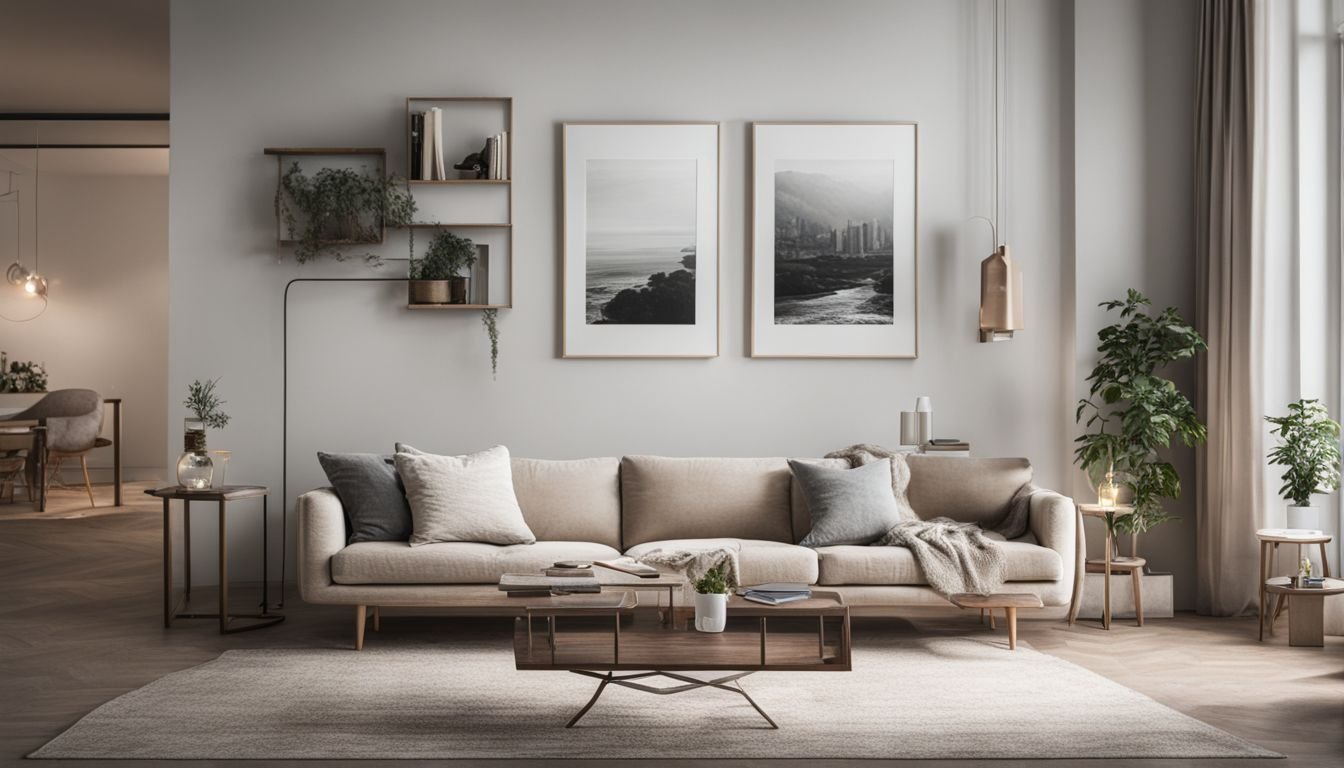Why Clutter Causes Stress And Anxiety
Why Clutter Causes Stress And Anxiety
Clutter isn't just a pile of things; it's a complex problem that can ramp up stress and trigger anxiety. Imagine walking into a room filled with stacked papers, scattered toys, and misplaced items—it’s enough to make your mind spin.
Clutter causes our senses to work overtime on stuff we don’t need, which cranks up our stress levels. Sometimes, the mess even stops us from moving around freely in our own homes, leading to frustration and feelings of being trapped.
Making decisions gets tougher when surrounded by too much stuff; choosing what shirt to wear or which bills to pay first becomes an exhausting task all because there's simply too much clutter competing for attention.
Moreover, the dread of someone seeing the chaos can bring about shame or stop us from inviting friends over altogether. Research points out that women living in cluttered houses tend to have higher cortisol levels—a clear sign linking messiness with stress hormones pumping through our bodies.
In contrast, clearing out space can calm those jangled nerves and plant seeds for creativity and productivity while boosting how good we feel about ourselves and where we live. The answer seems simple: organize your surroundings to soothe your mind.
But where do you begin? Strategies like sorting possessions into categories or asking professionals for some extra help are good starting points.
As this article unfolds, discover methods for conquering clutter before it conquers you. Transform your home into a peaceful haven—it’s time for change!
The Link Between Clutter and Stress
The presence of clutter in our living spaces can lead to stress and anxiety due to visual overload, physical barriers, decision fatigue, feelings of embarrassment or shame, safety hazards, and difficulty relaxing.
These factors contribute to an increased sense of overwhelm and can have a significant impact on our mental well-being.
Clutter causes visual overload
Clutter bombards our living spaces with excess items and distractions, challenging our ability to focus and process information. Experts warn that a cluttered home can flood your senses with stimuli, making you feel overwhelmed.
Imagine constantly stepping over toys on the floor, struggling to find important papers on a crowded desk, or navigating through a garage filled to the brim with boxes. This sensory overload demands attention from your brain at every turn, leaving less mental energy for relaxation and clear thought.
Clearing away mess isn't just about aesthetics; it's crucial for maintaining calm and order in your life. Engaging in regular housekeeping or investing in a deep cleaning service leads to more than just shiny countertops and streak-free shower doors—it creates an environment where your mind can rest easy.
As we navigate through the various physical barriers created by clutter next, remember that each item cleared is a step towards peace of mind and restored focus.
Clutter creates physical barriers
Moving beyond the visual chaos, clutter also presents tangible challenges in our homes. It can turn open spaces into an obstacle course, with stacks of books on floors, piles of clothing draped over chairs, and knick-knacks crowding your countertops.
This accumulated mess not only hampers your ability to move freely but often conceals important items like bills or keys, adding frustration to daily routines. The impact extends beyond inconvenience; cluttered environments may contribute to accidents at home as navigating becomes more hazardous.
Physical discomfort is yet another byproduct as you twist and contort around objects just trying to get through a room. Over time, these constant micro-adjustments can lead to poor posture and back pain.
Moreover, rooms meant for specific tasks lose their purpose when they're barricaded with unused gadgets or endless paper trails. A study nook transforms into storage space; your peaceful bedroom now doubles as a makeshift laundry sorting area—each scenario stripping away from the comfort and practicality that well-organized spaces provide.
Clutter leads to decision fatigue
Navigating around clutter not only hampers your movement but also exhausts your mind. Every extra item in a space competes for your attention, making daily decisions tougher than they need to be.
Imagine standing before a dresser overflowing with clothes: picking an outfit should be simple, yet the chaos forces you to sift through piles of fabric, which can leave you feeling drained before breakfast.
This everyday scenario is just one example of how mess leads to mental fatigue. Studies confirm that excessive stimuli in our environments overtax our brains and diminish our decision-making capabilities.
This challenge can spiral into stress and anxiety as the burden of unmade choices accumulates. In workplaces crowded with papers or homes where countertops are lost under mail and dishes waiting for the dishwasher, the strain mounts silently but surely.
Clearing out lint from beneath furniture during vacuuming or opting for easy-to-clean microfiber furnishings becomes more daunting when faced with a myriad of other unresolved tasks spawned by disorganization.
Clutter can be a source of embarrassment and shame
Feeling overwhelmed by clutter can lead to feelings of embarrassment and shame, particularly when unexpected visitors drop by. A messy environment can result in these emotions, especially when others visit.
Too much clutter can contribute to slips and falls, as well as experience social isolation. Additionally, clutter may even create a cycle of guilt and embarrassment due to its impact on mental health.
Clutter also has the potential to cause feelings of loneliness and shame, impacting not just the physical space but one's emotional well-being. Therefore, addressing clutter is vital for creating an environment conducive to positive mental health.
Clutter can be a safety hazard
Clutter poses a safety risk in your home. Tripping over misplaced items or struggling to navigate through cluttered spaces can lead to accidents and injuries. In the event of an emergency, such as a fire, clutter obstructing pathways could impede your ability to evacuate swiftly, putting you and your family at risk.
Additionally, piled-up possessions may block ventilation systems or become fire hazards, increasing the potential danger during emergencies.
To mitigate these risks, it's important to maintain clear pathways throughout your living areas and ensure that essential safety equipment like smoke alarms are not obstructed by clutter.
Clutter makes it difficult to relax
Living in a cluttered environment can make it challenging to find peace and unwind. The constant visual chaos can overwhelm the mind, making it hard to focus on relaxation. This creates a physical and mental barrier that inhibits the ability to de-stress effectively.
Piles of belongings and disorganization contribute to a sense of unease, leaving little room for tranquility or rest. Items scattered around can be visually distracting, disrupting the calm atmosphere needed for relaxation.
How Clutter Affects Our Mental Health
Clutter has a direct impact on our mental health, leading to increased levels of the stress hormone cortisol, affecting mood and self-esteem, and causing feelings of overwhelm and anxiety.
These effects can have long-term implications on our overall well-being.
Increased cortisol levels
Clutter in your home can trigger a physical stress response, leading to elevated cortisol levels. Research shows that women who perceive their homes as cluttered experience higher levels of cortisol, the stress hormone.
This physiological reaction to clutter can contribute to feelings of anxiety and overwhelm, impacting overall mental well-being. Creating a decluttered living space may help mitigate these effects and promote a sense of calm and relaxation.
Now let's explore how clutter creates physical barriers within our living spaces.
Impacts mood and self-esteem
Increased cortisol levels can significantly impact your mood and self-esteem. Research has revealed that prolonged exposure to clutter can lead to increased levels of stress, anxiety, and even depression.
These negative emotions can take a toll on your overall well-being, affecting how you feel about yourself and your surroundings. Therefore, the presence of clutter in your home or work environment may contribute to feelings of inadequacy and low self-esteem.
Additionally, constantly being surrounded by disorder may hinder your ability to find peace and tranquility within yourself.
Increases anxiety and stress
Clutter bombards the mind with excessive stimuli, leading to increased anxiety and stress. Studies have shown that living or working in disorganized spaces can trigger feelings of overwhelm and contribute to heightened levels of cortisol, the stress hormone.
As clutter creates visual chaos and physical barriers, it exacerbates decision fatigue and impairs relaxation. Moreover, the embarrassment and shame associated with clutter can further elevate anxiety levels among individuals.
The presence of clutter not only makes it difficult to relax but also contributes to a constant state of unease as it impacts mood, self-esteem, and overall mental well-being. Additionally, women who perceive their homes as cluttered tend to exhibit elevated cortisol levels, signifying its direct link to increased stress levels.
Leads to feelings of overwhelm
Clutter in our surroundings creates chaos. Our brains prefer order, and disorganization can quickly overwhelm them. When clutter accumulates, it becomes challenging to focus and think clearly, leading to increased tension and stress.
This buildup of items can cause feelings of confusion and even decrease our ability to make decisions confidently. As a result, clutter doesn't just cause physical disarray; it also contributes significantly to mental overload.
To combat these overwhelming feelings caused by clutter, we need effective strategies for decluttering our spaces.
The Benefits of Decluttering
Decluttering offers numerous benefits, including reducing stress and anxiety, improving mental clarity, boosting creativity and productivity, and enhancing overall well-being.
Reduces stress and anxiety
Decluttering reduces stress and anxiety by creating a peaceful and organized living environment. Removing excess items can alleviate visual overload, allowing for a sense of calm and clarity in your surroundings.
A clutter-free home also makes it easier to relax, promoting mental well-being and reducing feelings of overwhelm. Additionally, decluttering helps lower cortisol levels, improving mood, self-esteem, and overall emotional health.
Clearing out unwanted items from your living space not only eases stress but also enhances productivity and creativity while contributing to an improved quality of life. Regular upkeep through cleaning routines aids in maintaining this positive impact on mental health.
Improves mental clarity
Decluttering your living space can improve mental clarity as it reduces the visual and mental distractions that clutter creates. When you clear out unnecessary items, it becomes easier to focus on tasks at hand, leading to a more organized and clear mindset.
Studies have shown that an uncluttered environment can lead to improved cognitive function and decision-making, allowing for better mental acuity and reduced stress levels.
Creating a decluttered living space could also positively impact your overall well-being by reducing anxiety and increasing productivity. Ridding your home of excess belongings can help create a sense of tranquility, making it easier to concentrate on daily activities without feeling overwhelmed or scattered.
This improved mental clarity extends beyond just the physical environment, impacting your ability to think clearly in all areas of life.
Boosts creativity
Decluttering your environment can enhance creativity. Clearing out unnecessary items allows for physical movement and organization, creating a space that fosters new ideas and innovation.
Studies have shown that reducing visual distractions from clutter can lead to increased cognitive clarity, enabling the brain to process information more effectively. Embracing decluttering as a regular practice not only promotes a sense of calm but also provides an environment where creative thoughts can flourish.
Moving on to "Increases Productivity," let's explore how decluttering can positively impact your efficiency and effectiveness in various aspects of life.
Increases productivity
Decluttering energizes individuals, boosting problem-solving abilities and task completion. It aids in decreasing anxiety levels, enhancing sleep quality, and sharpening focus - all contributing to a more productive lifestyle.
Clearing clutter from your living space not only improves mental clarity but also fosters creativity. Furthermore, organized surroundings facilitate efficient decision-making and time management, ultimately leading to heightened productivity within daily activities.
Enhances overall well-being
Decluttering not only increases productivity but also enhances overall well-being. A clutter-free environment promotes a sense of calm and tranquility, reducing stress levels and promoting mental clarity.
By decluttering your surroundings, you create physical and mental space for relaxation and rejuvenation, contributing to improved mood and overall well-being.
Furthermore, a tidy living space can lead to better organization of thoughts and emotions, fostering a positive outlook on life. The act of decluttering itself can be empowering, instilling a sense of achievement and control over one's environment.
Strategies for Tackling Clutter
Implementing effective strategies to tackle clutter is essential for reducing stress and anxiety. Starting small, setting realistic timelines, sorting items into categories, using the four-box method, and seeking help from professional organizers can all contribute to creating a clutter-free environment.
These techniques empower individuals to take control of their space and promote a sense of calm and organization.
Start small and focus on one area
To begin decluttering, start in one small area such as a countertop or a drawer. Focusing on this limited space makes the task feel more manageable and reduces the likelihood of becoming overwhelmed by the process.
By concentrating on just one area at a time, it becomes easier to make decisions about what to keep and what to let go of, leading to a sense of accomplishment and motivation to continue decluttering.
Taking small steps in decluttering can be empowering, especially when dealing with stress and anxiety caused by clutter. By breaking down the task into smaller parts, you can gradually work towards creating a more organized and peaceful living environment.
Set a realistic timeline
Create a realistic timeline for decluttering to avoid feeling overwhelmed. Break down the task into smaller, manageable goals over several days or weeks. This approach can help maintain motivation and prevent burnout as you tackle each area of your home.
By setting achievable timelines, you can reduce stress and create a sense of accomplishment with each completed step.
To ensure success, allocate specific time slots for decluttering sessions in your schedule. Consistency is key to making progress without feeling pressured or rushed. By setting aside dedicated time for decluttering, you can steadily work towards achieving a clutter-free and stress-reduced living space, improving your overall well-being.
Sort items into categories
Sort items into categories to streamline your decluttering process. By categorizing clutter into physical, mental, and environmental aspects, you can effectively target specific areas for improvement.
Identifying these categories will help prioritize and tackle different types of clutter systematically, enabling you to create a clear plan for reclaiming your space. This method also aids in recognizing the root causes of stress and anxiety associated with clutter, empowering you to address each category with purpose and efficiency.
Categorizing items serves as a roadmap for decluttering and maintaining a calm environment. It supports the identification of problem areas while allowing for strategic planning to bring order back into your life.
Use the four-box method: keep, donate, trash, and undecided
After sorting items into categories, it's time to utilize the four-box method. This practical approach involves categorizing belongings into four distinct boxes: keep, donate/sell, trash, and undecided.
By doing so, you can systematically evaluate each item and make informed decisions about whether to retain, discard or donate them. The "keep" box is reserved for items that are essential or hold sentimental value while the "donate/sell" box allows you to part ways with items in good condition that could benefit others.
Alternatively, the "trash" box streamlines removal of broken or irreparable possessions. Finally, the "undecided" box provides a temporary space for items requiring further consideration before making final decisions.
Get help from professional organizers
When tackling clutter becomes overwhelming, seeking assistance from professional organizers can alleviate the stress and anxiety associated with a cluttered living space. Professional organizers offer guidance on effective decluttering strategies, providing support in managing physical manifestations of mental health issues related to clutter.
These experts can aid individuals in regaining control over their environment, reducing anxiety through organization and decluttering efforts. Additionally, organizing one's home with the help of professional organizers has been shown to improve anxiety levels and increase confidence, thus contributing to an overall sense of well-being.
Professional organizers enable individuals to achieve the lesser-known benefits of decluttering and creating an organized living or working space that directly impacts stress and anxiety levels.
Maintenance Tips for a Clutter-Free Life
Develop a cleaning routine, designate specific spaces for items, regularly assess and declutter, and practice minimalism to ensure a clutter-free environment. These maintenance tips will help in maintaining a clean and organized living space.
Develop a cleaning routine
Create a cleaning routine that suits your lifestyle and schedule. Sweep, vacuum, or dust regularly to maintain a tidy environment. In addition, consider setting specific days for tasks like changing bed linens or decluttering designated areas.
To effectively manage clutter, it's beneficial to incorporate organizing and maintenance into your weekly agenda. This consistency can help minimize stress and create a calming home environment where you feel at ease.
Next, let's explore the benefits of creating structured spaces within your home.
Have designated spaces for items
Designated spaces for items in your home can make a significant difference in reducing stress. When everything has a place, it becomes easier to find what you need and eliminates the frustration of searching for misplaced items.
This organization also contributes to managing clutter effectively, promoting a sense of calm and order within your living space.
Creating specific areas for each item not only addresses clutter-related anxiety but also streamlines the overall look and functionality of your home. It allows you to know exactly where things belong, ensuring that every item has its own rightful spot.
Regularly assess and declutter
Regularly assess your living space and declutter to maintain a peaceful environment. Set aside time each week to evaluate areas that tend to accumulate clutter, such as countertops or closets.
By regularly assessing and decluttering, you can create a serene atmosphere that promotes relaxation and reduces stress levels. Additionally, it allows you to stay organized and efficiently locate items when needed.
To start the process, designate specific days for decluttering different parts of your home. Create an action plan by breaking down the tasks into manageable chunks and sorting items into categories like keep, donate, trash, or undecided.
This approach will help streamline the decluttering process while preventing overwhelming feelings.
Practice minimalism
Reduce stress and anxiety by embracing minimalism. Simplify your surroundings by removing unnecessary items. Adopt a mindset of intentional living, focusing on what truly adds value to your life.
Consciously declutter areas one at a time, starting with small steps such as organizing a drawer or clearing out a closet. Reap the benefits of reduced stress and improved mental clarity as you create an environment that promotes calmness and tranquility.
By practicing minimalism, you can cultivate an uncluttered space that encourages peace and well-being. Embrace the liberating feeling of letting go of excess belongings, allowing for more physical and mental freedom to thrive in your daily life.
FAQs
1. How does clutter in my home lead to stress?
Clutter can make your home feel crowded and disorganized, which often leads to feeling stressed and anxious because it's harder to find things and relax.
2. Can a clean mattress help reduce anxiety?
Yes, having a clean mattress can improve your sleep environment, making you feel more comfortable and less anxious when resting.
3. Will getting carpet cleaning services reduce the stress I feel at home?
Definitely! Clean carpets not only look better but also create a healthier environment by removing dirt and allergens that could contribute to stress.
4. Is hiring a home cleaning service worth it for reducing anxiety caused by clutter?
Hiring a home cleaning service is valuable as they tackle the mess for you, leading to an organized space that lets you breathe easier without added anxiety.
Contact Birch Specialty Cleaning Company today for a cleaning estimate!


